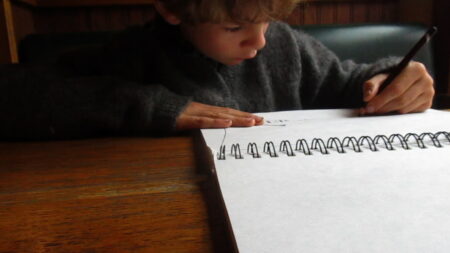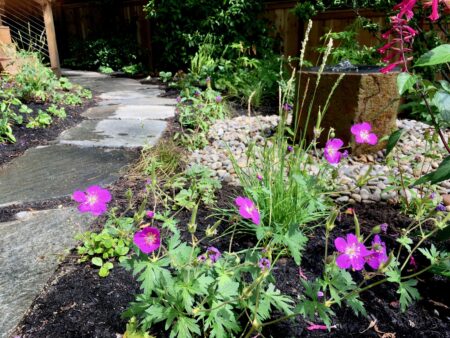Raise Your Garden as You Raise Your Children – Landscaping with Respect for the Nature of Your Site
October 1, 2019

Say you had a kid with an aptitude for math that loved making art and inventing contraptions. You tried tossing the football with him, but it wasn’t as fun you wanted it to be. You were pushing him to be into it, but the interest just wasn’t there. Perhaps you had dreams of an athletic scholarship for your mini-me, a future of weekend ball games and hot dogs in the stands. But, as you got to know who this child of yours truly was, you saw that he had other strengths, strengths worthy of attention, worthy of nurturing with love. You care for you kids and want the best for them. Clearly, athletic scholar wasn’t in the stars this time. But, with an open heart, you came to see what was. And it was better than you hoped for.
This same thing can happen with your expectations for your landscape. Your pinterest board may be filled with gorgeous gardens from all over the world. You see things you like and want to have it “just like that” in your yard. While it’s productive to clarify your style by looking at examples, you have to start with the yard you have, with the land, the climate, the micro-climates, the history, the story of the place. All the functional things you want from your yard, all the plants you want to grow, all the accessibility you desire has to be supported by the land you actually have.
So start there. If you’ve just moved into your house, take a year to acquaint yourself with the quirks of your outdoor spaces. If you’ve lived there for years, notice what you’ve taken for granted – that spot in the ell of your house where you pause for the warmth of the winter sun, the way the old apple tree casts the perfect dappled light to rest under, how the soil smells, where the weeds stay green in the summer, where the storms come from, and where the birds flock.
Our human story is one of conquering nature. Homo sapiens spread all over the globe, changing the landscape everywhere to meet our needs. In the process, we’ve disrupted a whole lot of natural ecosystems causing a loss of biodiversity. But, just because this conquering approach has made us the most successful species on Earth, doesn’t mean it’s a smart way to raise our children or develop our landscapes. In fact, a radically different approach is called for – an approach that comes from empathy with nature.
The first thing I do when I survey your yard is to ask the land what it wants to be. In other words, I use all my senses to observe on the macro and micro levels what’s going on. I look, smell, feel, listen, and maybe even taste all the existing features – soil, winds, light, plants, slopes, built features – so that I come to know the place. I want your design to resonate with the land as much as it resonates with you. A resource intensive design that imposes your will onto the site is going to be expensive to implement and to maintain. I’m interested in a harmonious solution that marries your needs with your yard’s inherent gifts.
Now, if your goal is to grow all your own vegetables and you purchased a home in the south hills with sloping clay soils and shade throughout the day, I’ll advise you to support our local farmers by joining a CSA instead. Farm land is perfect for growing food! Your yard is made for a different destiny. We could create a space for your family to enjoy outdoor dining accompanied by birdsong or we could develop meandering paths that allow you to contemplate the beauty of nature at the end of the work day.
There are creative ways that we can adapt your goals to best fit your site. For example, if your dream garden includes lush blooms of roses and tulips, but you live in deer country, we don’t have to start with a budget-hogging deer fence. Instead we could plant deer resistant beauties like peonies, poppies and coneflowers to give you the same floral pleasures without the extra cost. Or, maybe you love okra and hope to grow it in your Pacific Northwest garden. It’ll be hard to get a decent crop here, so, instead you could plant the hardy okra relative known as rose of sharon. It’s a beautiful late summer blooming shrub whose young blossoms can be harvested and prepared for dinner, tasting remarkably like okra!
I believe every yard has hidden under it’s weeds an elevated version of what it could be, just as every child has gifts that can be nurtured so they’ll become a happy and fulfilled adult. You may not know what your land’s gifts are. Maybe you’re an acclaimed professor of English literature or a retired physician. You have your inherent strengths, too! If you need help reading your land, please ask me. You’d likely seek help supporting your kid’s budding interest in piano if music was a mystery to you. Equally, developing your property is best done with the support of someone who has a clear appreciation for the hidden will of your land and it’s possibilities. The gardens we create are always informed by the nature of your site while being inspired by your dreams.

